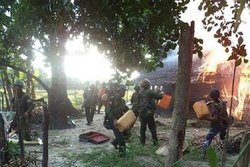 The United Nations called on the government of Bangladesh not to close the border to Rohingya Muslims fleeing war in Myanmar, after Dhaka declared that it would no longer take in Myanmar's Rohingya.
The United Nations called on the government of Bangladesh not to close the border to Rohingya Muslims fleeing war in Myanmar, after Dhaka declared that it would no longer take in Myanmar's Rohingya. RNA - Bangladesh's Foreign Secretary Shahidul Haque told the Security Council on Thursday that the refugee crisis had gone from "bad to worse", presstv reported.
Bedeplored the fact that none of the hundreds of thousands of Rohingya sheltering in his country had returned home.
"Bangladesh has been amazingly generous in the support they have given the Rohingya refugees," UN Spokesman Stephane Dujarric said, adding that it is important that people fleeing conflict are able to find safe haven wherever they go.
Under a deal reached with Bangladesh, Myanmar agreed to take back some of the refugees, but the UN insists that the safety of the Rohingya be a condition for their return.
Haque told a council meeting on Myanmar that "Bangladesh would no longer be in a position to accommodate more people from Myanmar", suggesting that his government was ready to close the border to refugees.
The Bangladeshi government also urged the UN Security Council to take action on the issue.
Last month, Bangladesh summoned Myanmar’s ambassador to protest against a new influx of refugees fleeing clashes in the restive Rakhine state.
Around 740,000 Muslim Rohingya are living in camps in Bangladesh after they were driven out of Myanmar's Northern Rakhine state during a military campaign in 2017 that the United Nations has described as ethnic cleansing.
Thousands of Rohingya Muslims were killed, and others only survived by fleeing to Bangladesh. The country was already home to 300,000 refugees who had fled earlier violence in Rakhine.
Now Myanmar’s Buddhists, who constitute the majority in the country, are in conflict with the military they backed to drive out the Rohingya just 18 months ago.
The Arakan Army (AA), a Buddhist rebel group calling for greater autonomy for Rakhine, conducted raids on police border posts on January 4. Thirteen people were killed by the rebel group. The army says 13 militants have been killed in retaliatory attacks while the UN says the violence left at least 5,200 people displaced.
The clashes have added a new, complex dimension to the troubles in Rakhine.
Rakhine has been the scene of communal violence since 2012. Many Muslims have been killed while tens of thousands have been forced to flee as a result of attacks by Buddhists. The refugees largely live in camps in dire conditions.
The Rohingya trace their presence in Rakhine back centuries, but most people in Buddhist-majority Myanmar see them as unwanted immigrants from Bangladesh, with the state denying the Muslims citizenship.
847/940